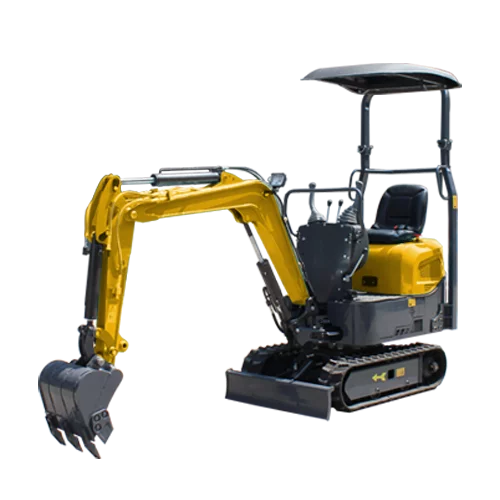Introduction
Excavators are essential machines in the construction industry, playing a pivotal role in various tasks such as digging, lifting, and grading. With the advancement of technology and the diverse needs of construction projects, different types of excavators have emerged to cater to specific requirements. In this blog, we will explore the les différents types d'excavateurs, their unique features, and their applications in construction. Understanding these machines will help construction professionals make informed decisions when selecting the right excavator for their projects.
The Importance of Pelles dans le domaine de la construction

Excavators are known for their versatility and efficiency in handling heavy-duty tasks. They are primarily used for:
- Creuser: Excavators can efficiently dig trenches, foundations, and holes for various construction purposes.
- Lifting and Moving: Equipped with powerful hydraulic arms, excavators can lift and move heavy materials, including soil, rocks, and debris.
- Nivellement et mise à niveau: Excavators can be used for grading land and creating level surfaces, essential for building foundations and roads.
Key Features of Excavators
Before diving into the different types of excavators, it’s important to understand the common features that make them effective for construction:
- Boom and Arm: The long boom and arm provide the necessary reach for digging and lifting.
- Système hydraulique: Excavators utilize a hydraulic system that enables powerful and precise movements.
- Tracks or Wheels: Depending on the type, excavators may have tracks for better stability on uneven terrain or wheels for faster movement on solid ground.
- Conception de la cabine: The operator’s cab is designed for comfort and visibility, ensuring safety during operation.
Different Types of Pelles
1. Crawler Excavators
Crawler excavators are equipped with tracks, providing excellent stability and traction on uneven and rugged terrain. They are commonly used in construction sites where mobility and power are essential.
Advantages:
- Stability: Tracks distribute weight evenly, reducing the risk of tipping.
- Versatile: Suitable for various tasks, including digging, grading, and demolition.
Disadvantages:
- Speed: Crawler excavators are slower than wheeled models.
- Mobility on Hard Surfaces: Not ideal for moving quickly on paved surfaces.
2. Wheeled Excavators
Wheeled excavators are designed with rubber tires, allowing for fast movement on smooth surfaces like roads and highways. They are ideal for urban construction projects where mobility is crucial.
Advantages:
- Speed: Faster movement between job sites compared to crawler excavators.
- Manœuvrabilité: Easier to navigate in tight spaces and urban environments.
Disadvantages:
- Stability: Less stable than crawler excavators on uneven terrain.
- Weight Capacity: Generally have a lower weight capacity compared to their crawler counterparts.
3. Mini Excavators
Mini excavators, also known as compact excavators, are smaller machines designed for working in confined spaces. They are ideal for residential projects and landscaping tasks.
Advantages:
- Taille compacte: Can fit into tight spaces and narrow paths.
- Easy to Transport: Lighter and easier to transport on trailers.
Disadvantages:
- Limited Power: Less powerful than larger excavators, making them unsuitable for heavy-duty tasks.
- Small Bucket Capacity: Smaller bucket sizes require more trips for material removal.
4. Long Reach Excavators
Long reach excavators are specialized machines designed for digging deep or reaching over obstacles. They are commonly used in applications such as dredging and demolition.
Advantages:
- Extended Reach: Capable of reaching further than standard excavators.
- Applications polyvalentes: Ideal for projects that require working over water or deep excavation.
Disadvantages:
- Coût: More expensive than standard excavators due to their specialized design.
- Complex Operation: Require skilled operators for effective use.
5. Hydraulic Excavators
Hydraulic excavators utilize hydraulic systems for smooth and powerful movements. They are commonly used for various construction applications, offering versatility and efficiency.
Advantages:
- De puissantes performances: Can handle heavy loads with ease.
- Precision Control: Hydraulic systems allow for precise movements.
Disadvantages:
- Maintenance: Hydraulic systems require regular maintenance to ensure optimal performance.
- Coût: Typically more expensive than manual or non-hydraulic options.
Comparison Table of Different Types of Pelles
| Type d'excavatrice | Mobilité | Stability | Puissance | Ideal Use |
|---|---|---|---|---|
| Pelle sur chenilles | Limitée | Haut | Haut | Heavy-duty construction |
| Pelle sur pneus | Haut | Modéré | Modéré | Urban projects |
| Mini-pelle | Haut | Faible | Faible | Residential and landscaping |
| Pelle à longue portée | Limitée | Modéré | Haut | Dredging and demolition |
| Hydraulic Excavator | Modéré | Haut | Haut | General construction tasks |
Considerations When Choosing an Excavatrice

When selecting an excavator for your construction project, consider the following factors:
Exigences du projet
Identify the specific tasks you need the excavator for. Heavy-duty tasks may require a crawler or hydraulic excavator, while residential projects may benefit from a mini excavator.
Conditions de terrain
Evaluate the terrain where the excavator will be used. Crawler excavators are best for rugged terrain, while wheeled excavators are suitable for smoother surfaces.
Budget
Determine your budget for acquiring or renting an excavator. Keep in mind that specialized machines may come at a premium price.
Operator Skill Level
Consider the skill level of the operators. Some excavators, especially long reach and hydraulic models, may require experienced operators to handle them effectively.
Conclusion
Comprendre la les différents types d'excavateurs available in the construction industry is essential for making informed decisions on equipment selection. Each type of excavator offers unique features and advantages tailored to specific tasks and project requirements.
By evaluating factors such as project needs, terrain conditions, and budget, construction professionals can choose the most suitable excavator for their projects, ensuring efficiency and productivity on the job site. As technology continues to evolve, we can expect further advancements in excavator design, making them even more versatile and effective in construction applications.
FAQ
1. What is the average cost of an excavateur?
The cost of an excavator can vary significantly based on its type and features. Mini excavators can range from $15,000 to $50,000, while larger crawler or hydraulic excavators can cost between $100,000 and $500,000 or more.
2. How do I determine the right size excavator for my project?
The right size excavator depends on the scope of your project, including the type of tasks, the terrain, and the materials being moved. It’s essential to consult with equipment providers to assess your specific needs.
3. Are excavators easy to operate?
Excavators require skilled operators, especially for larger and more complex models. Training is often necessary to ensure safe and effective operation.
4. How often should excavators be maintained?
Regular maintenance is crucial for excavators to ensure optimal performance. Routine checks should be conducted daily, with more extensive maintenance performed based on usage and manufacturer recommendations.
5. Can I rent an excavateur au lieu d'en acheter un ?
Yes, many construction companies choose to rent excavators based on project needs. Renting can be a cost-effective option, especially for short-term projects.
